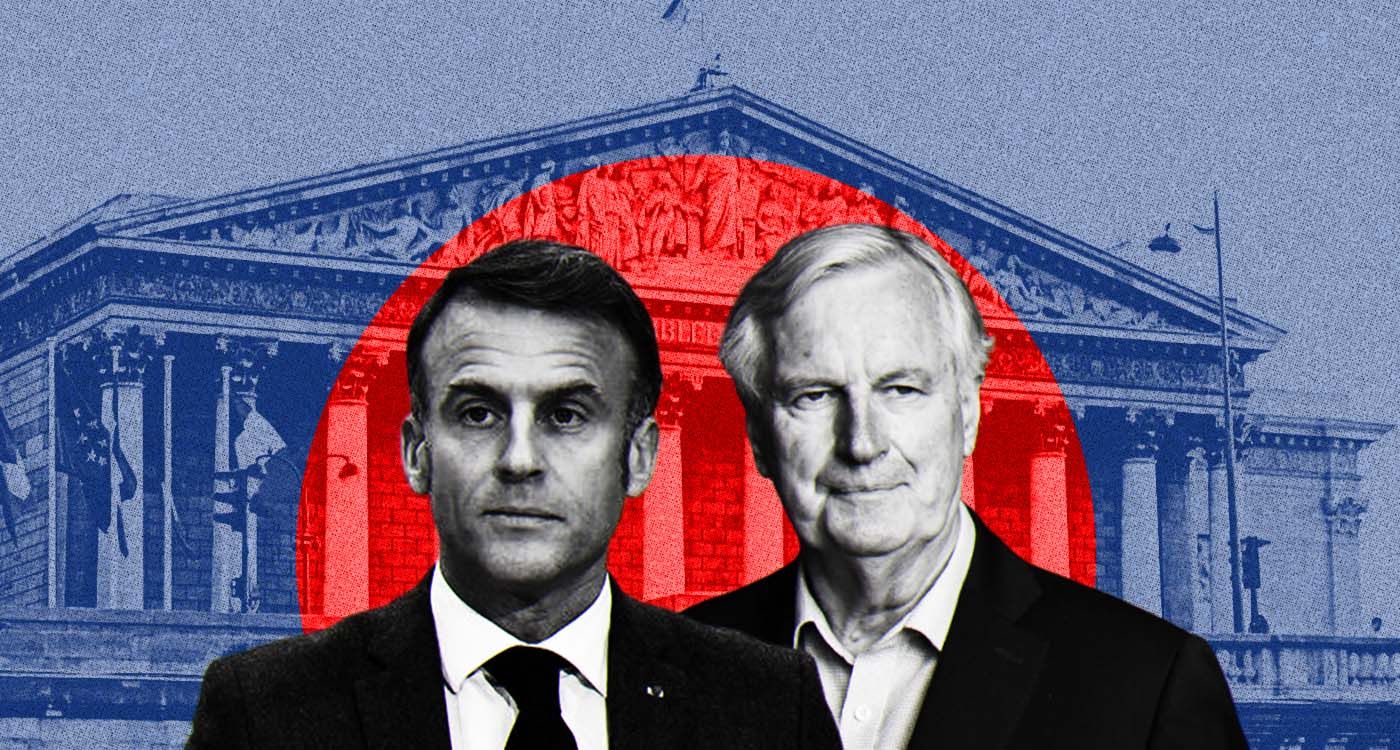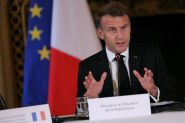- Home
- Middle East
- France's Unprecedented Political and Institutional Crisis

©This is Beirut
Since Wednesday, France has been experiencing its most severe political and institutional crisis in over six decades.
For the first time since 1962, a motion of censure passed in the National Assembly resulted in the resignation of Prime Minister Michel Barnier.
President Emmanuel Macron, who “acknowledged” the gravity of the situation, addressed the nation from the Élysée Palace on Thursday, condemning the chaos orchestrated by the opposition forces behind the censure. Macron, however, refrained from any self-criticism, focusing instead on promising swift action to stabilize the government. He assured that a new Prime Minister, capable of fostering collaboration among the nation’s fractured political factions, would be appointed imminently. According to TF1-LCI, this appointment could occur as early as Monday, following the customary political consultations.
But how did France reach this point, and what might the country's political future hold amid this institutional impasse?
The current crisis in France stems from two critical developments. The first was the dissolution of the National Assembly last June by the President, a move that was widely misunderstood and deemed unjustified by many observers. The ensuing elections that produced a highly polarized assembly, with the National Rally (NR), the New Popular Front, and the presidential majority camp forming three opposing blocs.
This three-way division resulted in an institutional deadlock, with no single bloc securing a clear majority. As a result, the survival of any government is contingent on avoiding censure from the rival political forces.
The left and far-left coalition, emboldened by their electoral success, have persistently pushed for the censure of any government not originating from their ranks. However, the pivotal factor behind the motion's passage was the National Rally (NR)’s calculated abstention from lending support. From the outset of Michel Barnier’s appointment, Marine Le Pen, leader of the NR group in the Assembly, had taken a more moderate stance, ruling out systematic censure.
The second factor involves Michel Barnier’s tenure which was marked by strategic miscalculations. Despite his extensive political acumen, he underestimated the key role the RN would play. From the moment he took office at Matignon, Barnier was acutely aware of his precarious position. Securing the National Rally’s support was vital to prevent a censure motion. Yet he clung to the belief, until the last moment, that Marine Le Pen and her allies were bluffing.
Initially, Barnier believed that the ideological demands of the left would conflict with those of the Republicans, positioning the NR as a pragmatic partner. This assumption quickly unraveled. When he offered concessions, such as altering drug reimbursement policies, Marine Le Pen seized the opportunity to escalate demands, focusing on sensitive budgetary reforms. It became evident that the NR’s goal was not to negotiate but to erode the government’s stability and increase pressure on Emmanuel Macron, potentially forcing his resignation.
What would the way forward be amid this profound institutional and political crisis? The political impasse has revived discussions about forming a coalition that transcends traditional partisan divides. This idea, however, has deepened divisions within the former presidential majority. While some advocate for a broad coalition encompassing the Socialist Left and Republican Right, efforts remain fragmented.
In the National Assembly, prominent figures such as François Bayrou, leader of MoDem, are working behind the scenes to bridge the gaps, using the pension reform issue as a bargaining tool. Bayrou aims to position his movement at the forefront of this potential alliance, forging ties with the Socialists to stabilize the government.
Yet, skepticism abounds. Within the former majority, many question Bayrou’s ability to lead a transformative coalition. Critics argue that his leadership might amplify internal discord and further undermine Macron’s position. Rumors of Macron’s possible resignation have only gained traction following reports from BFMTV of a private lunch between the President and Bayrou at the Élysée palace.
Among the potential solutions to the ongoing political crisis, the swift appointment of a Prime Minister from the right or center appears to be the favored choice. This approach would offer Emmanuel Macron the advantage of maintaining some continuity in his reform agenda without abruptly diverging from his previous policies. However, it would not guarantee a long-term stability, as evidenced with Michel Barnier’s tenure. Several names are under circulation for Barnier’s replacement. Sébastien Lecornu, the Minister of Defense, is a strong contender. With his political background and moderate stance, he might succeed in easing tensions with the National Rally. Moreover, according to TF1-LCI reports, Emmanuel Macron initially considered naming Lecornu as Prime Minister during his address but backtracked due to objections from within his own camp.
Other prominent figures, such as François Bayrou or François Baroin, both of whom have the political gravitas to rally support across party lines. However, these choices are far from consensus-building and carry inherent political risks. Appointing a right-wing Prime Minister could ignite fresh confrontations with opposition forces, further destabilizing the already fragile political landscape.
An alternative being explored is the appointment of a left-leaning Prime Minister under a non-censure pact encompassing a broad spectrum of the political landscape—from the right to the Socialist left. Advocates, including some Socialist Party members, see this as a chance to defuse tensions by expanding the government’s support base. However, this option faces significant challenges. La France Insoumise has firmly rejected any notion of collaboration with centrists or the right, making such an alliance contingent on a difficult split between the social-democratic left and the far left. This division is further complicated by shared electoral platforms, intensifying internal conflicts within the left. Additionally, while some centrists like Gabriel Attal have shown cautious openness to this possibility, implementing such a pact could be hindered by divergences on key issues, such as pension reform or immigration policy.
This scenario might break the deadlock but would require significant compromises between the various political forces, which remains uncertain and fraught with obstacles. In any case, it is increasingly clear that the presidential camp and the Republicans will need the support of the social-democratic left to sustain any government. Yet Macron’s direct criticism of the Socialist Party for its role in passing the censure motion during his recent address raises questions about his ability to foster collaboration.
While the suggestion of a “technical” government has been floated as a potential solution to France's political impasse, it appears to lack serious traction. In the current climate, such an option is widely regarded as a superficial fix, unlikely to address the underlying tensions or restore political stability.
Political actors from across the spectrum thus seem to agree on one fundamental point: resolving the crisis will require much more than mere technical management of public affairs but rather a genuine and broad political consensus capable of transcending entrenched divides.
Finally, among the scenarios being discussed to break the current institutional deadlock, Emmanuel Macron’s resignation, though almost improbable, emerges as a controversial yet persistent option.
While this possibility has been subtly suggested by the far right and explicitly advocated by the far left through impeachment motions, it reflects growing questions about the President’s political legitimacy. By toppling the government through the motion of censure, the National Rally has indirectly fueled speculation about Macron’s potential resignation. In an interview with Le Monde, Marine Le Pen suggested that repeated government failures could make presidential resignation appear as the only viable solution to the crisis.
Although the National Rally stops short of explicitly calling for Macron’s resignation, its representatives suggest that such a move would benefit France. This strategy, underlying its discourse, aims to further weaken the Executive while increasing pressure on the process of appointing a new Prime Minister.
At the same time, the prospect of an early presidential election has emerged as a proposal to redefine the political landscape and restore a form of stability, which many believe has been compromised by Macron’s governance. While this rhetoric seems calibrated to bolster the National Rally’s influence on the political scene, it is perceived by the presidential camp as a strategic maneuver, particularly in connection with judicial challenges facing certain National Rally leaders. This dual approach—between institutional pressure and political opportunism—illustrates the growing tensions in an already uncertain climate marked by deep distrust in public institutions.
Ultimately, the current crisis underscores a recurring question raised since the election of this fractured Assembly: has France become ungovernable? Regardless of the envisioned scenario—whether a technical government, a coalition, or a leadership shift—each faces the same challenge: a lack of consensus in this deeply fragmented political context.
Read more




Comments